There is a youthful, vibrant side to Calabrian wine, capable of rising above the usual stereotypes. This Calabria is defined by small producers who have the courage to break with convention and tradition, while remaining deeply rooted in their land. Embodying this spirit are Mario Alberto Romano, 42, the driving force behind Origine & Identità, and Cosmo Rombolà, 49, head of Cantina Masicei. These two winemakers are united by more than geographic proximity: a deep friendship, a shared vision, and a determination to promote and enhance the wines of the Vibo Valentia area—a region better known for the crystal-clear waters that bathe the famous Costa degli Dei. Their wineries stand on opposite sides of the same valley, separated by the Fiumara della Ruffa (also known as Torre Ruffa), just a stone’s throw from Capo Vaticano. These postcard-perfect places, where hills and cliffs blend into a landscape of rare beauty from Tropea to Pizzo and Nicotera, form the backdrop for a pioneering oenological project. Here, separated only by the intermittent stream of the fiumara, the two friends have embarked on a bold winemaking journey: producing traditional method sparkling wines using native grape varieties like zibibbo and magliocco canino—grapes no one had dared to use for sparkling wine, either in this corner of Tyrrhenian Calabria or elsewhere.
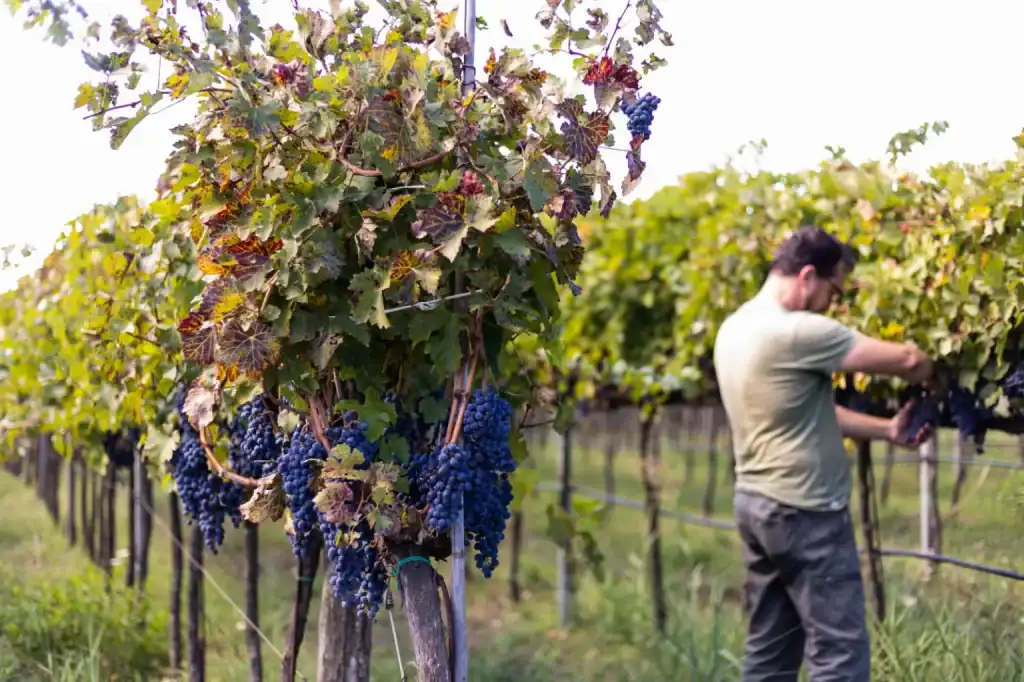
Mario Alberto Romano does not come from a winemaking family—his background lies in the restaurant world, a realm that sparked his deep appreciation for wine and eventually led him to produce it himself. In 2018, he founded Origine & Identità in Brivadi, a small hilltop village 130 metres above sea level near Capo Vaticano, nestled within just four hectares of land cultivated using strictly natural practices. That same year, Mario made his first wines with the help of his friend Cosmo at the nearby Cantina Masicei, beginning a journey of mutual influence and collaboration.
“My passion for wine quickly became a passion for vineyards and grape transformation. Zibibbo, with its dual purpose as both table and wine grape, fascinated me straight away and encouraged me to experiment,” says Mario. For him, producing zibibbo in this part of Calabria is a natural choice, consistent with a centuries-old tradition: brought over by the Saracens more than a thousand years ago, zibibbo has become deeply intertwined with local history. However, venturing into the traditional method sparkling wine with this grape was a far bolder step: “a real gamble, taken on with enthusiasm and conviction from the very beginning.”
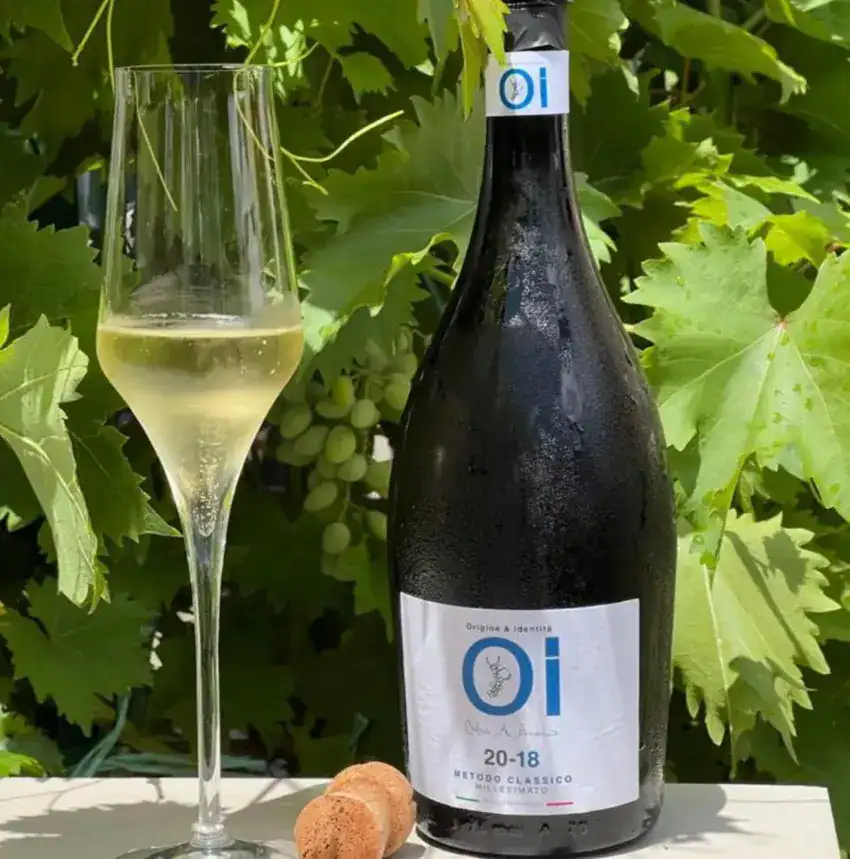
His metodo classico range is symbolically named 20-18, in honour of his first vintage. It currently includes a pure zibibbo and a rosé made from magliocco canino. Both spend at least 24 months on the lees before disgorgement; the latter, whose first vintage (2019) was made with grapes from Cosmo’s vineyards, will go even further, with the 2021 vintage maturing for 60 months on the lees (disgorgement planned for 2027).
But Mario’s work with zibibbo goes beyond sparkling wine—of which he produces 1,000 bottles annually. His winery also offers several expressions of the grape: a fresh, savoury ancestral method; a slightly macerated still white (Evoluzione); a long-maceration orange wine (Centodì); and a late harvest oxidative-style wine (La Tradizione), aged in amphora. His total output hovers around 8,000 bottles, including 1,000 bottles of rosé sparkling wine from magliocco canino (also available as an ancestral sparkling, a still rosé, and a still red). “All my wines are based on the same grape variety, harvested at different times and processed using spontaneous fermentations and exclusively stainless-steel ageing,” says Romano. “Minimal intervention, low sulphur, no filtration: this allows the full character of the grape and the territory to shine through.”
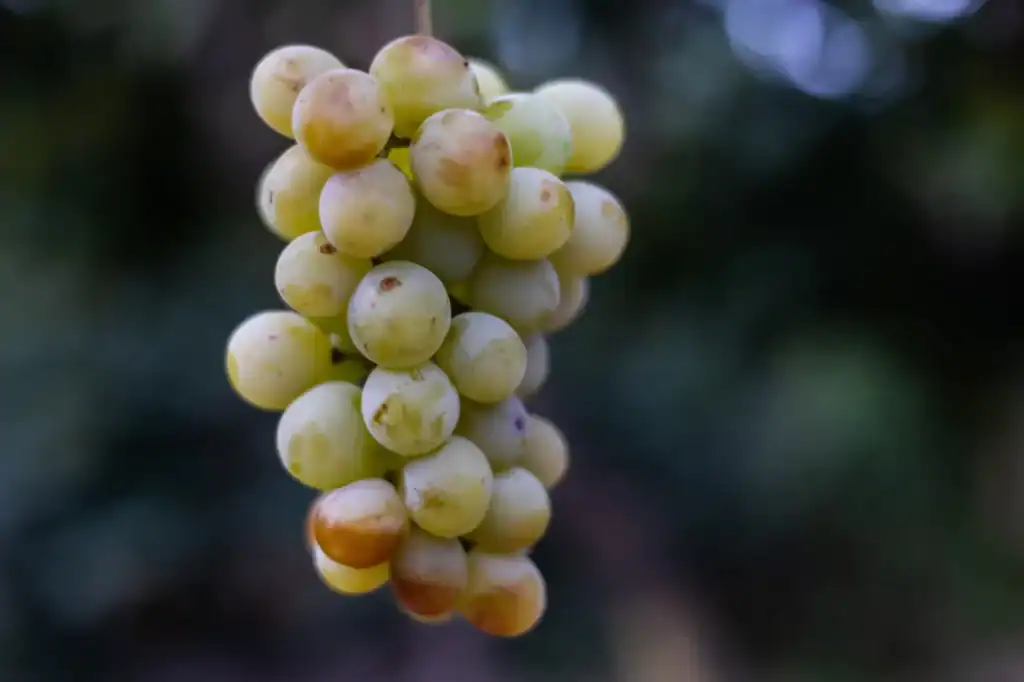
Across the valley, in Brattirò di Drapia, Cosmo Rombolà and Cantina Masicei offer a different yet equally grounded interpretation of the same land and grapes. Unlike Mario, Cosmo has winemaking in his blood: both his grandfathers tended vineyards—his maternal grandfather sold grapes, must, or wine, while his paternal grandfather made wine for the family. In 2012, Cosmo built his winery on the very site of the old wine press used by the latter, in the Masicei district, and planted a hectare of vines. The remaining vineyards that make up the estate’s four hectares are scattered nearby, mostly inherited or purchased from other family members.
On soils similar to those of Origine & Identità, but at a higher elevation (just over 300 metres above sea level) and farmed using “agro-ecological” practices, Cosmo, inspired by the same convictions as Mario, began experimenting with traditional method sparkling wines at roughly the same time. His first bottled vintage was 2019—the same year he supplied magliocco canino grapes for the inaugural 20-18 rosé from O&I.
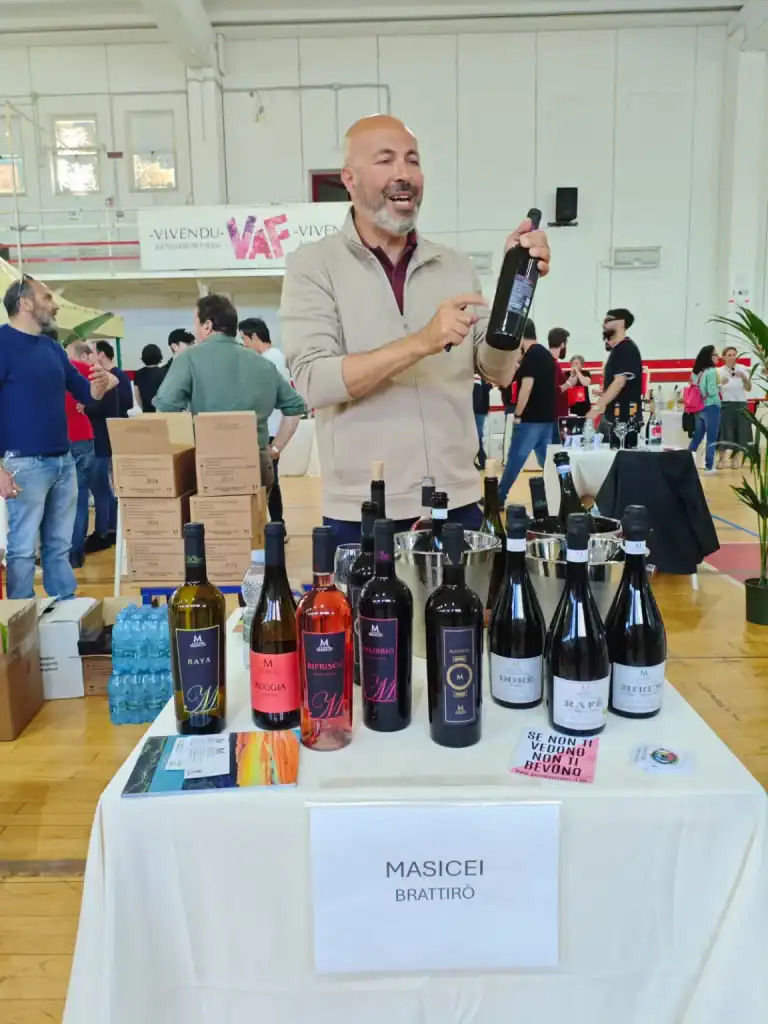
“We both believe strongly in our territory and the potential of these grapes, especially as sparkling wines,” explains the Cantina Masicei owner. He produces three sparkling wines, totalling around 2,000 bottles per year: Dorè, made from zibibbo only; Rafè, a pure magliocco canino rosé; and Mirum, a unique and original blend of magliocco canino and zibibbo, where the sweet, fruity aroma of the zibibbo softens the vibrant acidity and grippy tannins that give magliocco its name—“canino” (like a dog’s bite).
Cosmo employs a similar strategy in his Rifriscu, a still rosé where the fruit and softness of 20% syrah help tame the nervous energy of the magliocco—perhaps more than zibibbo, the true standard-bearer of the Costa degli Dei.
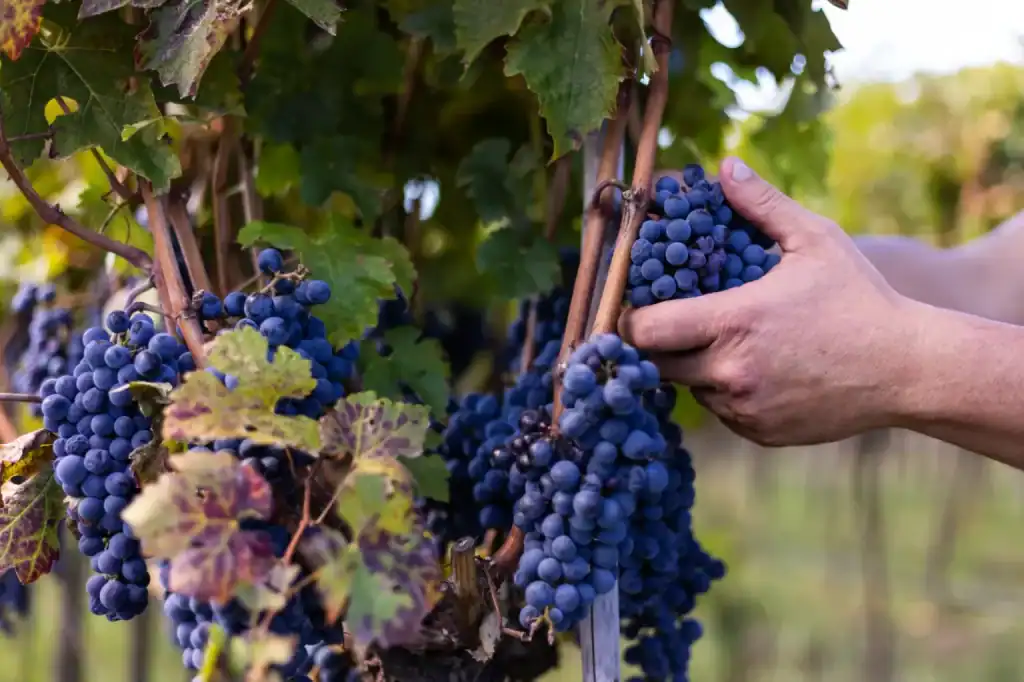
With differing but coherent styles, Mario Alberto Romano and Cosmo Rombolà are writing a new chapter in Calabrian viticulture, pouring the sea, wind, history, and future of their land into every glass. A land that’s more than just ‘nduja and crowded beaches—it holds immense potential. A potential that Origine & Identità and Cantina Masicei express in their own voices, united by sparkling wines with strong character. “We truly believe in the journey we’ve taken with sparkling wines and are convinced it’s the right path to showcase our region in an original way, without neglecting tradition. Our area has huge potential, even if it’s still not well known outside the region. We hope the arrival of the D.O.C. will help us reach a wider audience. Personally, I believe even more in the potential of magliocco canino—it’s a native grape to this area with extraordinary qualities,” reveals Rombolà, acknowledging his preference for this pine-cone-shaped cluster that, along with zibibbo, both in pure form and unblended, will embody the spirit of the forthcoming Costa degli Dei D.O.C.

© Gambero Rosso SPA 2025
P.lva 06051141007 Codice SDI: RWB54P8 Gambero Rosso registrazione n. 94/2021 Tribunale di Roma
Modifica impostazioni cookie
Privacy: Responsabile della Protezione dei dati personali – Gambero Rosso S.p.A. – via Ottavio Gasparri 13/17 – 00152, Roma, email: [email protected]
Resta aggiornato sulle novità del mondo dell’enogastronomia! Iscriviti alle newsletter di Gambero Rosso.
© Gambero Rosso SPA – Tutti i diritti riservati.
Made with love by Programmatic Advertising Ltd
Made with love by Programmatic Advertising Ltd
© Gambero Rosso SPA – Tutti i diritti riservati